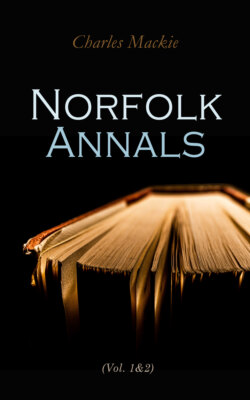Читать книгу Norfolk Annals (Vol. 1&2) - Charles Mackie - Страница 229
На сайте Литреса книга снята с продажи.
APRIL.
Оглавление5.—The London mail by way of Bury and Newmarket was discontinued, and two light four-inside coaches, called the Mercury, substituted, starting from the Angel Inn, Norwich, at 4.45 p.m., and from the Golden Cross, Charing Cross, London, at six p.m., Sundays excepted. The proprietors of the Expedition post coach substituted two light post coaches which ran from the Swan Inn, Norwich, every afternoon at four o’clock, and from the White Horse, Fetter Lane, London, at 4.30. The mail by Bury and Newmarket had been established 33 years, and was discontinued from lack of public support. The Norwich and London mail by Ipswich and Colchester continued to run as before.
8.—The Eau Brink Drainage Bill was read a third time in the House of Commons, and the Act was subsequently passed for increasing the fund for carrying into execution the several previous Acts for improving the drainage of the fens, and the navigation of the several Norfolk rivers communicating with the river Ouse.
11.—Six prisoners escaped from the Norwich City Gaol by breaking through an 18-inch brick wall, whence they entered the snuff manufactory of Messrs. Waite and Cozens, and with their irons on made their way to the Market Place. With one exception they were speedily recaptured.
—*“According to the returns of the Tax Office to March 25, 1817, the Norfolk Land-tax amounted to £63,471 10s. 7d.; redeemed, £18,526 16s. 2d.”
14.—The Norwich Paving Commissioners, in consequence of complaints regarding the imperfect lighting and watching of the streets, appointed a committee of fourteen of their members, and co-opted other persons, to superintend the placing of the watchmen. The committee were requested to “occasionally perambulate the city, and to observe the state of the lamps and the conduct of the watchmen.”
18.*—(Advt.) “To be fought at the White Swan Inn, Norwich, on Monday, April 20th, 1818, and two following days, three double days play of cocks for 10 guineas a battle, and 200 guineas the odd, between the gentlemen of Norwich and the gentlemen of Cambridge. Feeders: Lamb for Norwich, Thompson for Cambridge.”
—*(Advt.) “The London and Norwich mail coach by Colchester and Ipswich. The Postmaster-General having thought proper to discontinue the mail coach by Newmarket, which had been established 33 years, from the public not having latterly given it that support which its usefulness demanded, the contractors for the remaining mail by Ipswich and Colchester, which will in future be the conveyance of the Norwich letters, hope that so useful a carriage in this commercial city and county will have such success as to promote its future encouragement and continuance.”
23.—St. George’s Day was observed in Norwich as the festival of the tutelar saint of England and as the appointed date for the celebration of the birthday of the Prince Regent. St. Peter’s bells were rung, and at night a ball was given at Chapel Field House.
24.—A meeting, presided over by Mr. J. J. Gurney, was held at the Lancasterian School, Norwich, to encourage the establishment of Sunday schools.
26.—Died at Norwich, aged 47, the Rev. Augustus Beevor, M.A. “He was educated at Bennet College, Cambridge, where he early distinguished himself, and as a reward of his literary merits, received many college prizes. He was rector of Berghapton, Norfolk, and of Otley, Suffolk.”
27.—After the interval of 15 years the boundaries of the county of the city of Norwich were perambulated by the Mayor (Mr. Crisp Brown), attended by the Sheriffs, several of the aldermen, city officers, and others on horseback, and by a great number of persons on foot. Much beer was drunk en route, and at Earlham the chief personages were entertained by Mr. J. J. Gurney, and 400 men and boys received each a pint of beer and a piece of cake. A man swam the river at Earlham, another crossed it at Hellesdon. “When proceeding in the direction of Sprowston they were met on the road, leading from Norwich to Crostwick, by Mr. James Cozens, who formally declared his intention to protest against the establishment of the line of boundary which they were taking, and pointed out a boundary mark nearer Norwich, which on inspection proved to be that of St. Clement’s parish.”
